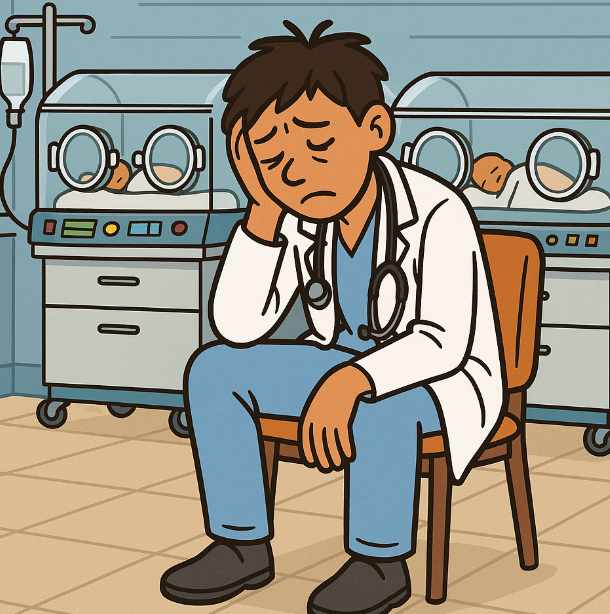
Inside the Crisis of OB-GYN Resident Burnout
It is 4:45 a.m. when a young OB-GYN resident walks into the hospital for rounds. She has already worked two overnight shifts this week. Before noon, she will help manage complex labor, interpret fetal tracings, and assist with emergency procedures. The pager never seems to be quiet. Everyone around her expects flawless performance because every decision matters. By evening, the exhaustion begins to settle into her bones, but there are still more charts to complete, more patients to see, and more difficult conversations to manage. This is the day hundreds of residents live regularly across the world, and the new evidence shows that the emotional cost of this pace is becoming unsustainable.
A new systematic review, published in Frontiers in Public Health, evaluated 16 studies that included more than 2,200 OB-GYN trainees and found that burnout among residents ranges from 46 percent to 86 percent. These rates consistently rank among the highest in medicine, signaling an urgent public health concern.
Why Burnout is So High in OB GYN
The review shows that burnout is not a simple reaction to stress but a predictable outcome of the conditions that shape residency. Many OB-GYN residents handle prolonged shifts that exceed 40 hours per week. In several studies, more than a third of respondents reported working over 75 hours per week. Long hours, night shifts, and urgent clinical demands leave little room for recovery. Younger age, being early in residency, and being single all increase risk. Many residents describe feeling isolated or emotionally depleted long before their training ends.
The specialty carries a unique blend of technical, emotional, and social pressure. OB GYN residents perform high-stakes procedures while navigating some of the most sensitive moments in patients’ lives. The review found that strained patient relationships, mistreatment in the workplace, and a lack of institutional support amplify emotional exhaustion. Residents in several countries also described cultural or legal pressures that created fear and anxiety, including malpractice risk and, in some settings, harsh penalties for adverse outcomes. Together, these factors shape an environment in which burnout becomes almost inevitable for many trainees.
What the Evidence Shows About the Impacts
Burnout presents as emotional exhaustion, depersonalization, and a reduced sense of personal accomplishment. In OB-GYN training, emotional exhaustion is consistently the most common symptom. Depersonalization also appears frequently, which is concerning because it is associated with reduced empathy, lower patient satisfaction, and a higher frequency of clinical errors.
Several studies included in the review reported that OB-GYN residents with burnout were more likely to experience anxiety, depression, and suicidal thoughts. In some countries, burnout was strongly associated with physicians’ intent to migrate or leave clinical practice altogether. The review also highlights the role of personal and family psychiatric history, which can make trainees more vulnerable to both burnout and mental health symptoms during residency.
These findings illustrate a cycle that affects not only residents but also the patients and communities they serve. When the workforce at the frontline of maternal health is exhausted or unsupported, the quality and safety of care can suffer.
How the Study Was Conducted
The authors searched four major databases and reviewed thousands of records to identify studies on burnout among OB-GYN residents. They applied PRISMA guidelines to ensure transparency in the screening and selection process. Sixteen studies met the criteria and included residents from the United States, Europe, Asia, the Middle East, and Africa. Most studies used validated measures such as the Maslach Burnout Inventory or the Copenhagen Burnout Inventory. The wide variation in study settings and instruments prevented a pooled meta-analysis; however, the narrative results were consistent across contexts. OB-GYN residency consistently emerges as one of the specialties with the highest risk of burnout.
What This Means in Practice
Public health and hospital leaders can take specific steps to support OB-GYN residents. Reducing excessive work hours can help protect against burnout and errors related to fatigue. Creating safe and supportive learning environments can help counteract mistreatment and enhance psychological safety. Programs that address the transition from medical school to residency can help reduce early burnout among trainees when they are most vulnerable.
Organizations can also invest in mental health resources and normalize their use. Regular check-ins, access to counseling, and confidential reporting mechanisms may help residents seek support before reaching crisis. Strengthening team culture, offering mentorship, and promoting collaborative decision-making can foster trust and a sense of belonging. Policies that improve staffing levels and reduce administrative burdens can make workloads more manageable, giving residents more time for rest and recovery.
Promising Strategies and Interventions
Several interventions highlighted in the review appear to improve resident well-being. Mindfulness-based programs, such as yoga or structured resilience training, have been shown to help decrease emotional exhaustion. Participation in Balint groups supported reflective practice and improved emotional regulation. Healthy lifestyle habits, including regular physical activity and a balanced diet, were associated with a lower risk of burnout. Satisfaction with skill development and opportunities for meaningful learning also reduced burnout.
However, the authors emphasize that individual-level interventions are insufficient. Systemic reform is essential and should address workload, autonomy, workplace culture, and professional recognition. Without meaningful structural change, supportive programs will have limited impact.
What Comes Next
Addressing burnout among OB-GYN residents requires coordinated action from policymakers, training institutions, professional societies, and health systems. Legislative approaches that protect residents’ well-being, enforce safe work hour standards, and expand mental health coverage can help reduce systemic risk. Research should continue to examine the long-term effectiveness of interventions and identify which system-level changes have the greatest impact. Given the central role of OB GYN clinicians in maternal health, the stakes for public health could not be higher.
Questions to Spark Discussion
- How might your institution improve its support for OB-GYN residents based on these findings?
- What workplace or cultural barriers might make it difficult to implement these changes?
- Where are the most promising opportunities for system-level reform in your organization?



